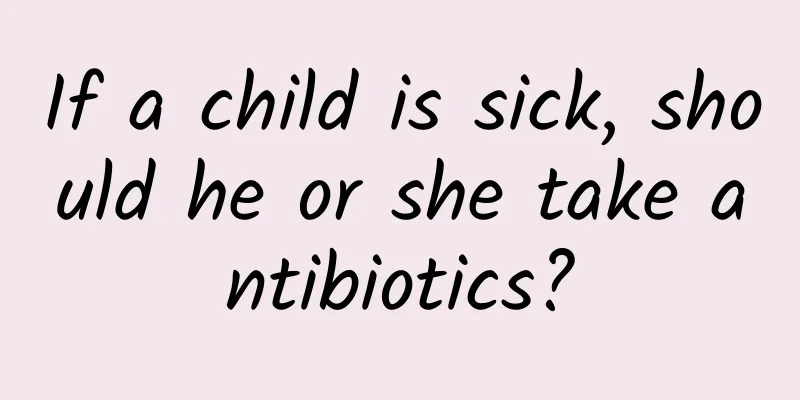If a child is sick, should he or she take antibiotics?

|
Recently, many children in the pediatric ward have symptoms such as fever and cough. Should antibiotics be used? Parents are puzzled. How should they be used? What should be paid attention to when using them? The following article will provide some scientific information! What are antibiotics? Antibiotics are chemical drugs mainly used to kill or interfere with the growth and reproduction of pathogens. They are what we often call anti-inflammatory drugs, such as amoxicillin, cefixime, azithromycin, etc. However, there are more than just antibiotics that have anti-inflammatory effects. There are also many traditional Chinese medicine preparations, such as Pudilan oral liquid, Lanqin oral liquid, etc. Antibiotic resistant What is it? Antibiotics are commonly referred to as "antimicrobial drugs" in medical terms. They are a general term for a variety of drugs used to treat diseases caused by pathogenic microorganisms such as bacteria and fungi. As the name "antimicrobial drugs" suggests, they fight bacteria, not viruses. Bacterial infection Antibiotics are needed Antibiotics are effective against bacteria, but not against viruses. Some people use antibiotics when they catch a cold, but many colds are caused by viruses, so antibiotics are ineffective at this time. In addition to colds, common viral infections in children include herpetic pharyngitis, viral enteritis, measles, chickenpox, hand, foot and mouth disease, etc. Antibiotics are only needed when a viral infection is secondary to a bacterial infection, otherwise they will not be effective. Health Tips: 1. Before using antibiotics, it is recommended to check the medicine carefully and read the drug instructions. Antibiotics will state in the "Indications" that they are used to treat infections caused by certain bacteria and fungi. 2. You must learn to identify common antibiotics, such as the penicillins commonly used in children, which are generally named **cillin; cephalosporins, which are cephalosporins; and macrolides, which include azithromycin, erythromycin, clarithromycin, etc. 3. Antibiotics are prescription drugs and must be purchased with a doctor's prescription. Follow the doctor's instructions when using them, only use the right medicine and use it in the correct way. 4. Love hygiene, wash your hands frequently, and reduce contact with pathogens. It is also important to exercise more, eat a balanced diet, and have a strong body! |
>>: Medication management in kidney disease: how to use medications correctly
Recommend
Will the follicles grow after taking the night injection?
For women who have difficulty getting pregnant, d...
Which early pregnancy test paper is better?
Due to the development of social economy and scie...
Severe preeclampsia
Severe preeclampsia can usually be treated with m...
For people with myocardial ischemia, what are some good dietary supplements? The doctor has explained it clearly this time!
In the hospital, there are always patients asking...
Six hormones for women
The six hormone tests are a type of test that wom...
Normal secretion examination report
Understanding the routine physical examination re...
What to eat for menstrual pain
I believe that many women have experienced dysmen...
Food Allergy vs Food Intolerance: Can You Tell the Difference?
Author: Wang Xueyan, Chief Physician, Beijing Cen...
Breast drainage tube
Nowadays, more and more patients suffer from brea...
Stop swallowing pills! These pills can also be chewed
Author: Huang Yanhong Duan Yuechu In daily life, ...
What is the reason for delayed menstruation and less menstrual volume?
In fact, in modern society, most women have probl...
Hyperemesis gravidarum is rejection of the fetus
When a woman enters pregnancy, vomiting is a norm...
How to relieve urinary tract infection in pregnant women
Urinary tract infection is a disease that women a...
Treatment for hard stomach at night in pregnant women
I believe that all of us have experienced the pro...
What are the treatments for vulvar ulcers?
Daily physical health is very important for women...









